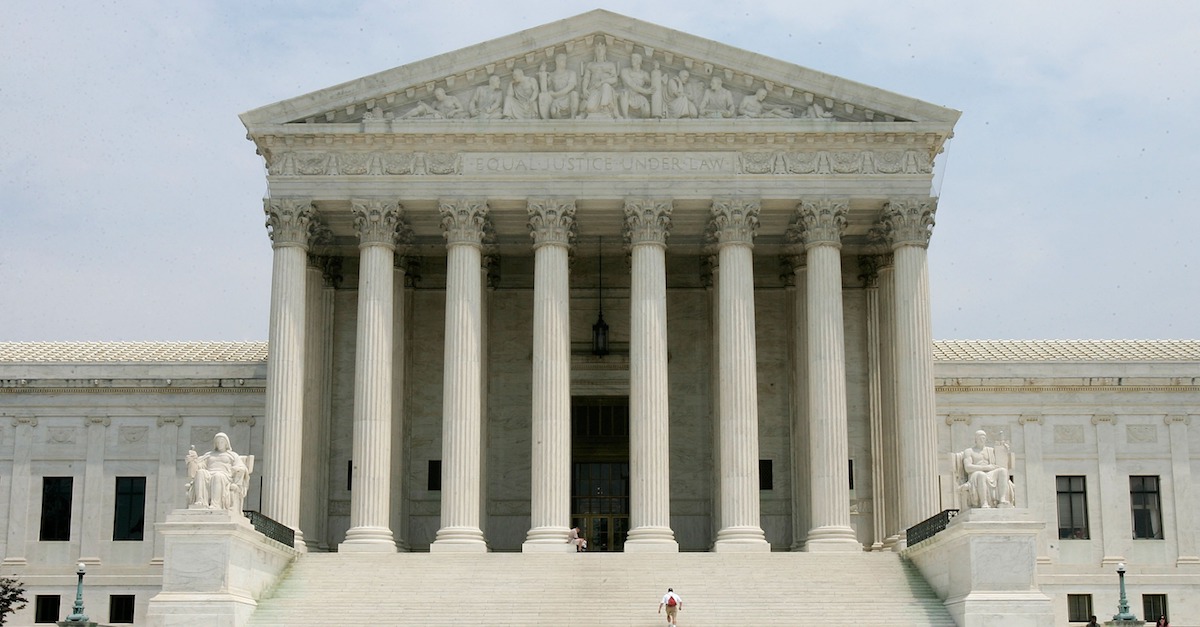
The Supreme Court of the United States has ruled that defendants in death penalty cases have the right to dictate trial strategy to their defense attorneys, a substantial enlargement of the Sixth Amendment right to counsel.
In the 6-3 decision in McCoy v. Louisiana, the Supreme Court found that a triple murder defendant, Robert McCoy, was not afforded his full Sixth Amendment rights to counsel after his defense attorney repeatedly rejected McCoy’s desire to insist on his innocence.
According to the majority opinion authored by Justice Ruth Bader Ginsburg, “[T]he defendant vociferously insisted that he did not engage in the charged acts and adamantly objected to any admission of guilt.” Ginsburg continued, noting, “Yet the trial court permitted counsel, at the guilt phase of a capital trial, to tell the jury the defendant ‘committed three murders. . . . [H]e’s guilty.'”
McCoy’s attorney, Robert English, allowed his client to plead not guilty while simultaneously telling a jury that his client was in fact guilty of the crimes committed. English’s strategy was to admit that McCoy engaged in the violent acts which took the lives of three members of his family, but to insist that McCoy lacked the mental state (mens rea) necessary for the killings to qualify as first degree murder.
When told of this strategy in advance, McCoy was vehement that he never committed the crimes in question and insisted that his attorney not follow through. In fact, McCoy repeatedly rejected this proposed strategy and English eventually attempted to bow out of representing his client due to the irreconcilable issues between what he and McCoy wanted to argue in court. English’s request to cease representing McCoy was denied by the judge and English went forward with the strategy his client opposed–despite ever-increasing comments from McCoy that this strategy was wrong and flawed.
The majority opinion notes the extent to which English admitted his client’s guilt:
At the beginning of his opening statement at the guilt phase of the trial, English told the jury there was “no way reasonably possible” that they could hear the prosecution’s evidence and reach “any other conclusion than Robert McCoy was the cause of these individuals’ death.”
When McCoy personally protested to the court, the court admonished him, arguing that English was “representing” McCoy and that “any other outbursts” would not be allowed. The Supreme Court’s decision rubbishes this concept, noting, “For the Sixth Amendment, in ‘grant[ing] to the accused personally the right to make his defense,’ ‘speaks of the ‘assistance’ of counsel, and an assistant, however expert, is still an assistant.”
While arguing for leniency and bidding for a second-degree murder conviction, English bragged that he “took [the] burden off of [the prosecutor]” regarding the necessary courtroom proving of McCoy’s alleged physical acts of violence. During this same state of the proceedings, McCoy took the stand and testified on his own behalf. The majority opinion notes the wide discrepancy here:
McCoy testified in his own defense, maintaining his innocence and pressing an alibi difficult to fathom. In his closing argument, English reiterated that McCoy was the killer.
Ultimately, McCoy was convicted of murder in the first degree three times over by a Louisiana jury. McCoy insisted, “I did not murder my family.” During the sentencing phase, English tried the same strategy again. He said, “Robert McCoy committed these crimes,” while urging mercy due to McCoy’s apparent “serious mental and emotional issues.” The jury returned three death penalty verdicts.
McCoy unsuccessfully appealed for a new trial with new counsel and the Louisiana Supreme Court affirmed the denial of that appeal. After that, McCoy appealed to the Supreme Court arguing that the trial court’s decision to allow English to concede McCoy’s guilt was a violation of the defendant’s Sixth Amendment right to counsel.
Again, Justice Ginsburg, “With individual liberty—and, in capital cases, life—at stake, it is the defendant’s prerogative, not counsel’s, to decide on the objective of his defense: to admit guilt in the hope of gaining mercy at the sentencing stage, or to maintain his innocence, leaving it to the State to prove his guilt beyond a reasonable doubt.”
The precise holding of the Supreme Court as reflected by the syllabus of the McCoy decision reads:
The Sixth Amendment guarantees a defendant the right to choose the objective of his defense and to insist that his counsel refrain from admitting guilt, even when counsel’s experienced-based view is that confessing guilt offers the defendant the best chance to avoid the death penalty.
[image via Alex Wong / Getty Images]